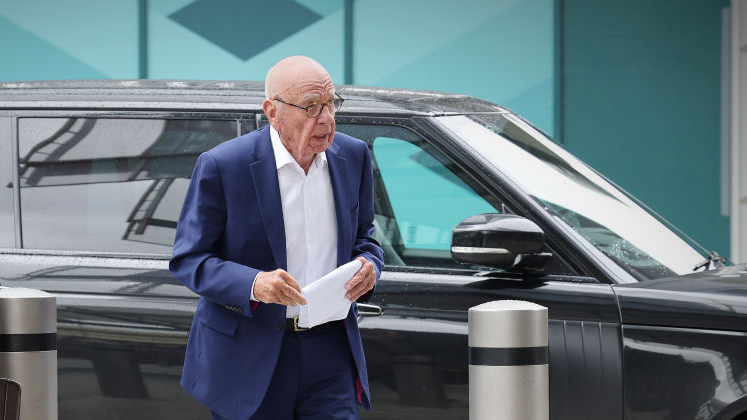The daily business briefing: September 22, 2023
Rupert Murdoch steps down as Fox, News Corp. chair, Cisco to buy Splunk in $28 billion cash deal, and more


A free daily email with the biggest news stories of the day – and the best features from TheWeek.com
You are now subscribed
Your newsletter sign-up was successful
1. Rupert Murdoch retiring as head of Fox, News Corp.
Rupert Murdoch, 92, is stepping down as chair of Fox and News Corp in November, the companies announced Thursday. The conservative Australian media mogul's eldest son, Lachlan Murdoch, will take over. Murdoch inherited an Australian newspaper from his father in 1952, then built a news and entertainment empire in the United States and Britain. He purchased big name newspapers, including The Wall Street Journal, but it was his creation of the conservative Fox News Channel that cemented his influence in U.S. politics, the Journal noted. Fox News hit a rough patch earlier this year when it was forced to pay $787 million to settle a defamation lawsuit linked to false 2020 presidential election claims. The Wall Street Journal, The Associated Press
2. Cisco to buy Splunk in $28 billion cash deal
Cisco Systems announced Thursday it had agreed to buy cybersecurity company Splunk in a $28 billion cash deal. The acquisition — Cisco's biggest ever — signals "a massive push into software and artificial intelligence–powered data analysis," Bloomberg reported. Cisco will pay $157 in cash per Splunk share, which marks a 31% premium over its Wednesday closing price. Splunk, based in San Francisco, helps companies monitor internal systems for things like network health and cybersecurity risks. "The IT landscape is changing faster than we've ever seen," Cisco CEO Chuck Robbins said. "With hyper-connectivity, AI and increasing cyber threats, the value of data only increases, and that's why this deal makes sense." Bloomberg
3. Home sales drop again
U.S. home sales dropped 21% from January to August compared to the same period last year, according National Association of Realtors (NAR) data released Thursday. The year before, sales fell 18%. The ongoing slowdown came as the Federal Reserve's campaign to raise interest rates to fight inflation has increased borrowing costs for homebuyers. The median home sales price increased 3.9% compared to a year earlier, to $407,100. The Fed paused its rate increases this week but signaled it might hike once more this year and keep rates high longer than previously anticipated. "Perhaps there could be some recovery taking place, but the last couple of data releases are implying no," said NAR chief economist Lawrence Yun. "Things are slumping down again." The Washington Post
The Week
Escape your echo chamber. Get the facts behind the news, plus analysis from multiple perspectives.

Sign up for The Week's Free Newsletters
From our morning news briefing to a weekly Good News Newsletter, get the best of The Week delivered directly to your inbox.
From our morning news briefing to a weekly Good News Newsletter, get the best of The Week delivered directly to your inbox.
4. Stock futures rise as rough week winds down
U.S. stock futures rose slightly early Friday after a three-day losing streak. Futures tied to the Dow Jones Industrial Average and the S&P 500 were up 0.1% and 0.2%, respectively, at 7 a.m. ET. Nasdaq futures were up 0.4%. The previous days' losses were fueled by investor concerns over the Federal Reserve's statement that, although it was keeping interest rates unchanged this month, it would likely keep rates higher for longer than previously anticipated to bring inflation down to its 2% target. The S&P 500 and the tech-heavy Nasdaq have fallen 2.7% and 3.5%, respectively, this week in what looks to be their worst weekly performance since March, CNBC reported. CNBC
5. FTC accuses anesthesia group, private equity owner of antitrust violations
The Federal Trade Commission has filed a lawsuit accusing U.S. Anesthesia Partners and its private equity owner, Welsh, Carson, Anderson & Stowe, of creating a monopoly and using it to increase profits by driving up prices. The FTC typically sues a company it believes is committing antitrust violations, but this time it is also accusing a private equity firm of driving the scheme, sending a warning message as the health care industry sees a wave of private equity takeovers. It would make sense to start with this case "because anesthesia is one of the first specialties that attracted private equity," said Brown University health economist Yashaswini Singh. "This indicates the FTC is not fooling around." Stat News
A free daily email with the biggest news stories of the day – and the best features from TheWeek.com
Harold Maass is a contributing editor at The Week. He has been writing for The Week since the 2001 debut of the U.S. print edition and served as editor of TheWeek.com when it launched in 2008. Harold started his career as a newspaper reporter in South Florida and Haiti. He has previously worked for a variety of news outlets, including The Miami Herald, ABC News and Fox News, and for several years wrote a daily roundup of financial news for The Week and Yahoo Finance.
